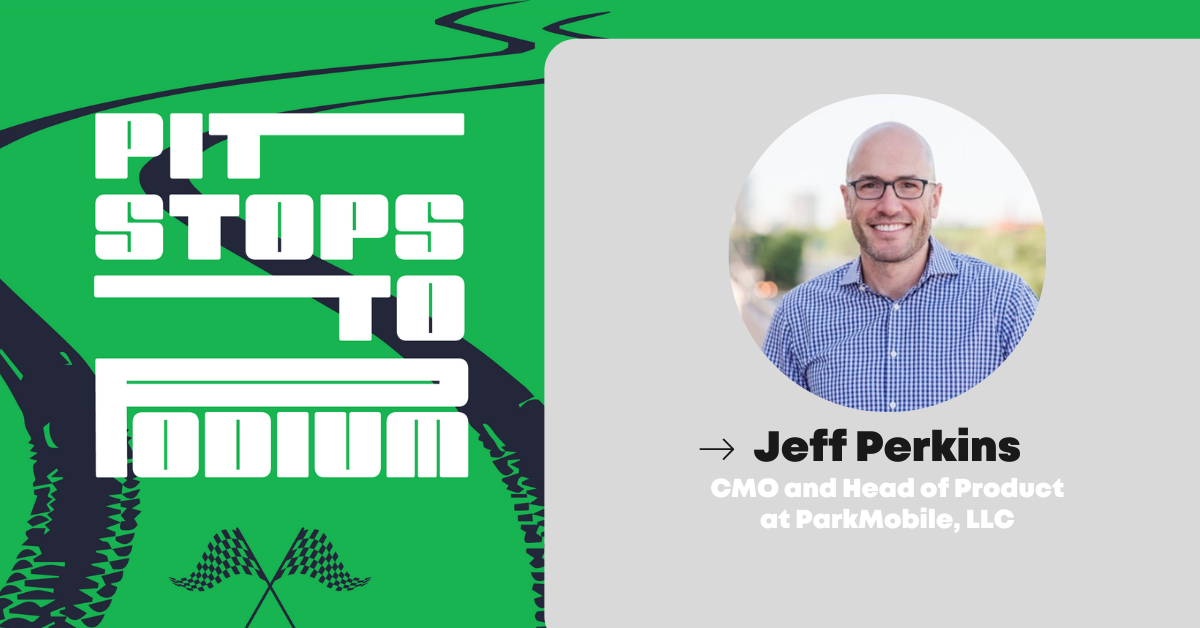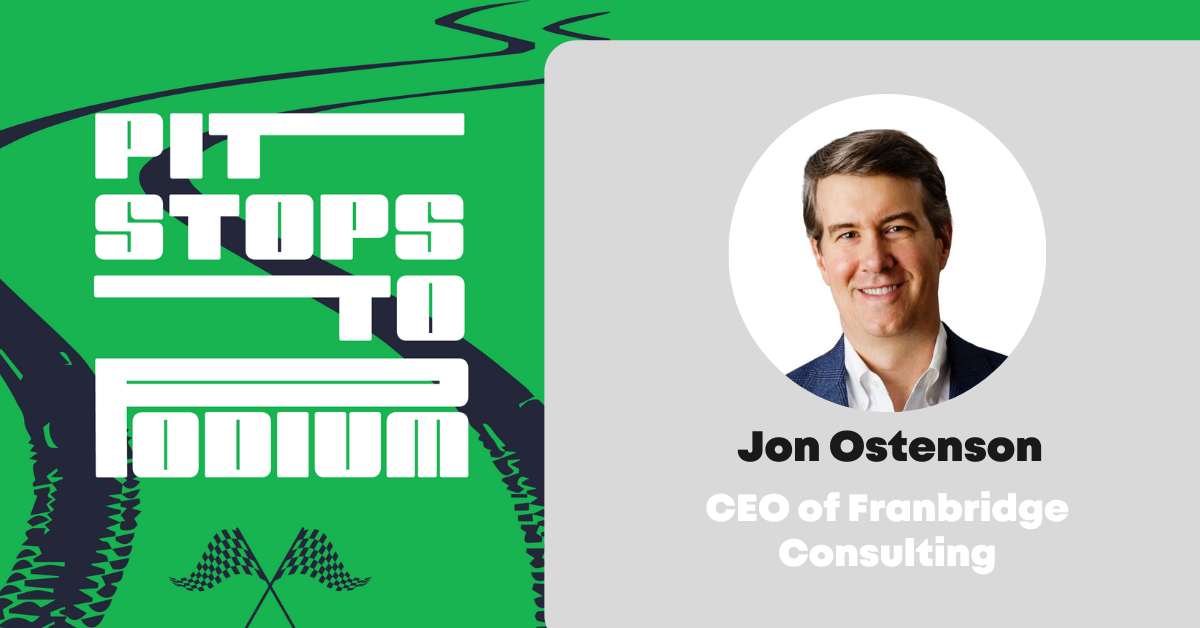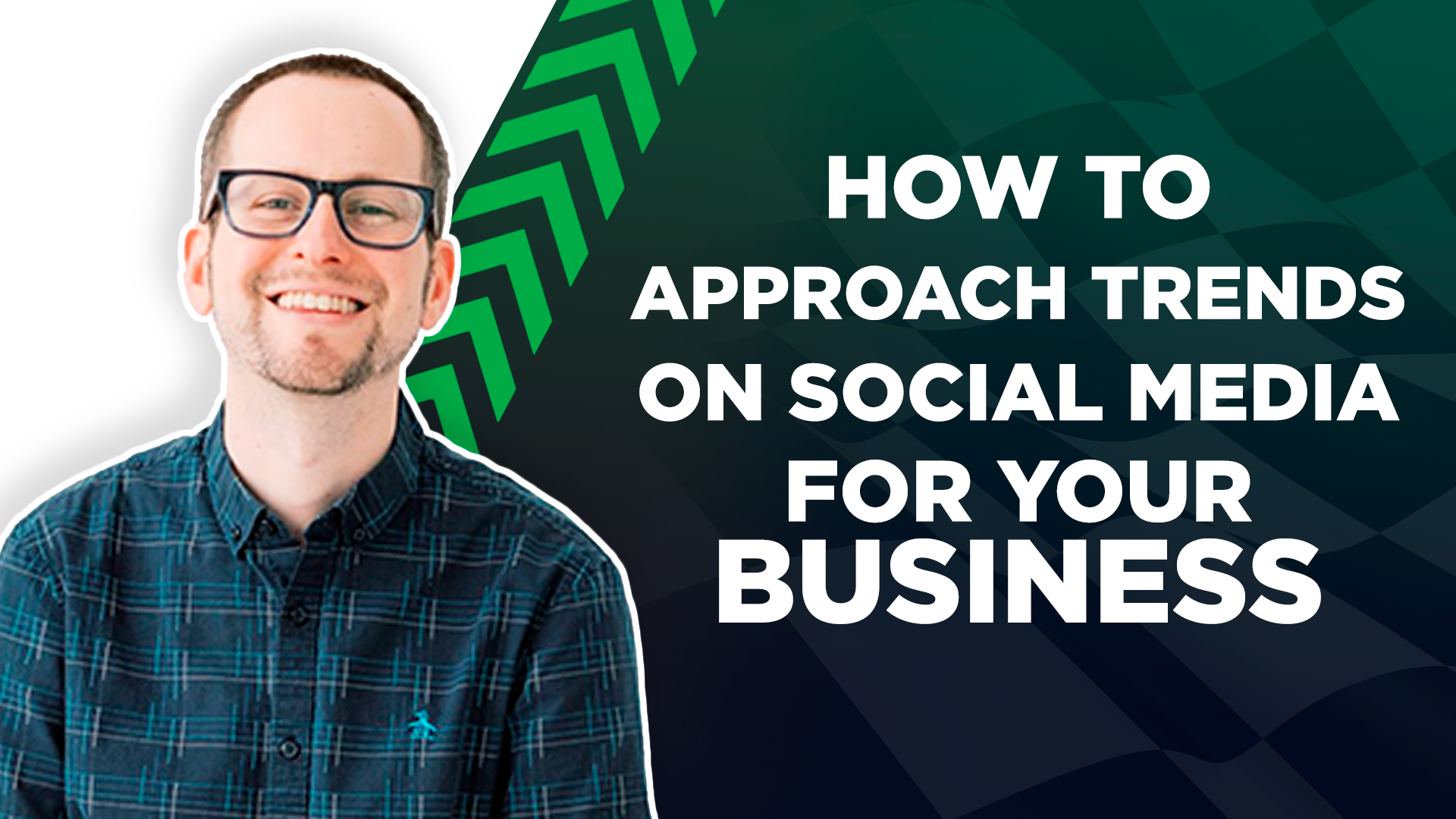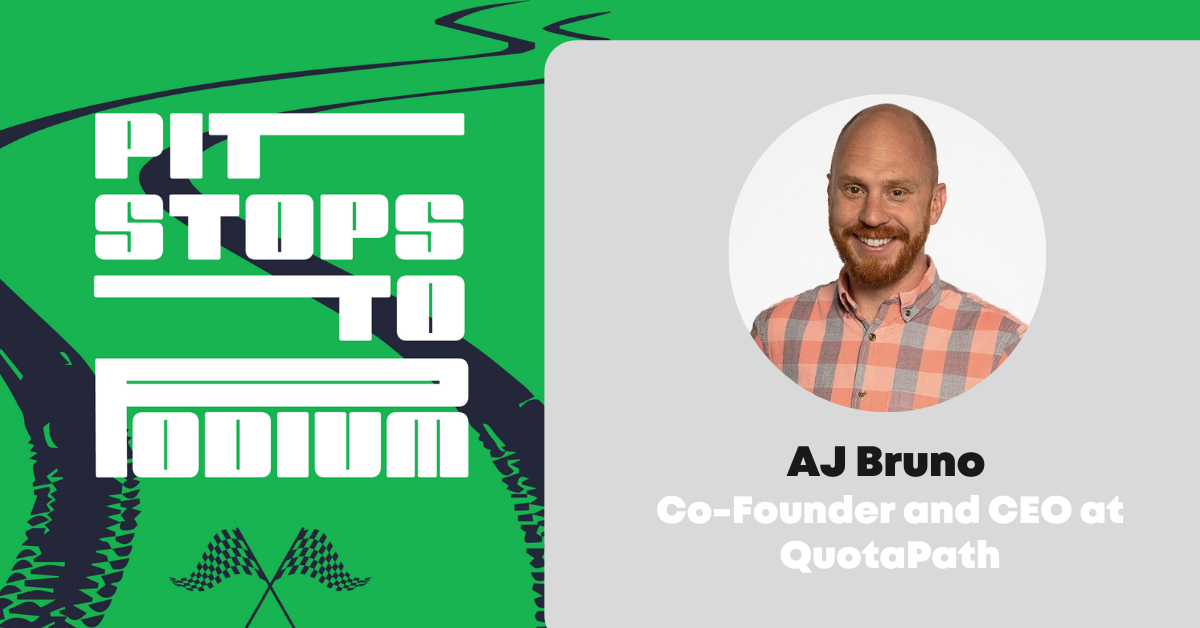Table of Contents
Strategies to Outlast the Average CMO Tenure of 18mo
As the average CMO tenure continues to decline, Jeff Perkins outlines his framework for breaking the trend and outlasting the average. Jeff is the CMO and Head of Product for ParkMobile, the #1 parking app in the United States with close to 25 million users. He operates his marketing efforts with focus, flexibility, and speed and is eager to connect with other marketing professionals over strategies and how not to suck at marketing, the title of his new book coming soon.
Hear what other concepts Jeff includes in his marketing success framework in Episode 12 of Pit Stops to Podium. Take 20 minutes to listen and then head back to the races! 🏁🏆
Pit Stop Highlights
Focus
"The most important decisions for Marketers and Sales Leaders today is not what to do, but what NOT to do because there are so many things you can do every day."
Bring in the focus:
- Fill in the blanks exercise to find the key things that you need to accomplish to fix problems and drive the business forward. “We are not growing revenue faster because of _____." “We are losing customers because of _____”
- Ask yourself: Can I draw a direct line from what I am doing as a Marketing leader to impact on the business?
Flexibility
"A lot of marketers fail when they are too rigid in their approach to the job...As a marketer, whenever you go into a new job or you take on a new responsibility, the most important thing is that you're not so rigid in the way you work that you're not constantly course correcting."
Flexibility looks like:
- Constant course correction
- Avoiding a one-size-fits-all approach
Speed
The larger plans and longer view are often correct, but don't deliver value and results immediately. You have to deliver wins along the way as you tackle the larger initiatives for people to see progress.
Jeff’s approach: Quick Win Strategy - Start by finding things to improve and implement where you could actually make an impact right away.
"It's just like in baseball. It's the teams that play small ball, just putting runners on base and putting runs on the board that win versus the teams that place everything on a home run swing."
Item’s Mentioned In This Episode
- New Read: How Not to Suck at Marketing
- New Resources: Best Marketing Resources
To continue the conversation you can follow Jeff Perkins on Linkedin and on Twitter @jeffperkins8! Or if biking is more your speed, you'll find Jeff as the original "Bald Guy" on Peloton.
Full Transcript
BT: Hey, everybody, welcome to pit stops to podium, the RevPartners podcast, we talk to execs who competed and won, taking their companies from high growth to high scale. My name is Brendan tolleson. I am the co-founder and CEO of RevPartners. And I'm excited to have with me today, Jeff Perkins, the CMO and Head of Product for part mobile, the number one parking app in the United States. Welcome, Jeff.
JP: Brendan, good to be with you.
BT: Jeff, before we get into the big idea for today, how about you give our audience a little bit more flavor on who park mobile is?
JP: Sure. So hopefully a lot of your listeners actually have the park mobile app where the number one app to pay for parking in the United states, we are in over 450 cities. We have almost 25 million users of the app. And in the Store navigation category, we are ranked number three only behind Google Maps and way. So it is one of these really big, very widely used apps. And if you've ever been frustrated with paying for parking at the meter or paying an attendant, it's a really fast and easy way to just pay on your phone and be on your way.
BT: Well, I can attest to that. I have been a user in the Atlanta area. City market for sure, has been much better having your app. So we appreciate what you've done. Well, Jeff, I know a little bit about you just because you and I have worked together in the past and in a different life. But for our audience, before we get the big idea, I'd love for you to share a few fun facts about you outside of the business world.
JP: OK, so outside the business world, a few things you should know about me. I'm from Philadelphia, so I'm a lifelong long-suffering Phillies Sixers Eagles fan. Now, I say I'm from Philadelphia. I'm from a part of Philadelphia, as some people refer to it as Southern New Jersey. So really a Jersey kid except for on the turnpike, if you're interested. And so as a Jersey kid, you know, it's like a requirement for people who grew up in Jersey around my age to be a big Bruce Springsteen fan, which I am. I've seen Springsteen about 32 times in concert. I'm really looking forward to getting back to live music. So I could see him again. So I've seen a lot. I seen him in all kinds of venues, including I saw his Broadway show twice. So huge. Springsteen fans of anyone out there wants to go geek out on Springsteen. I'm all and just put me on LinkedIn. And the last fun fact is that I am I'm a very good, Peloton rider. So if anyone has the Peloton bike, you could find me on the leaderboard. I've had the bike for a long time. I'm about 600 or so rides in and my leaderboard name is bald guy, bald guy. And so there's a lot of different. There's like there's like bald guy, one bald guy too. I'm the original bald guy on, Peloton. So if you think you can beat me, come, come at me, bro. I love that. I have a makeshift Peloton but at some point to upgrade and compete with you to be fun.
BT: Well, Jeff, you are one of the best cmos that I know, one of the best at creating brands. And I love the big idea for today, which is as a CMO or in really kind of a go to market executive role, how to not get fired. So I think it's a very applicable topic. I know it's a high stress type of role, especially when you are in that segment of a high growth, high scale from a performance perspective. But let's dive into that topic. And let's start with you have three key pillars, and those are focus, flexibility and speed. So let's start with focus.
JP: Yeah, so, you know, the way I think about this, and I actually, I've just finished writing my first book and I'll just plug it. It's called How To Not Suck at Marketing, and it's coming out later this year. But as I was writing the book, I was kind of thinking about what are the things that I've done differently than maybe some of my peers that have helped me from or prevented me from just getting fired because the CMO 10 year average of 10 years, usually around 18 months, sometimes less. CMOs, for some reason, don't last very long at companies. And I've actually, I've got a track record where I've seen that almost at every company. At every company I've been in, I've lasted much longer than the 18 month average. And I boil it down to, I think, three key things. In the first one that you lose, you focus when you are a marketer today or even when you're a sales leader today. The most important decisions you can make are not necessarily what to do, but it's what not to do because there are so many things you can do every day. There are so many tools out there that you can buy and implement for your company. And so it's like just shiny objects everywhere, which is always bad for marketing and salespeople because we're all kind of and then you have all these shiny objects, so no wonder no one gets anything done. But I found that having a real laser focus on what are the key things that you need to accomplish to fix problems and drive the business forward. That's what marketers need to do. I like to do a fill in the blanks exercise. And I saw a problem because it's like we are not growing revenue faster because of blank. We are losing customers because of blank. And when you start to fill in the blanks of what your problems are, it becomes very easy to focus. Right so if you're not growing revenue faster because you say lack awareness, you know that everything you have to focus on is driving greater awareness of your business. Right if you are not closing deals that are in the pipeline because you have a speaker disadvantage in your product or solution, you have to go fill that gap. Right and do those things that are the most critical to driving the success of the business. Before you do that, a million other things that you could do that will distract you from the core activity. And so when I think about focus, it's really focus on tactics where you can draw a direct line from what you're doing as a marketing leader to impact on the business. And if you can't do that, you have to rethink what you're doing.
BT: Yeah, I think the theme that I hear there is clarity and ultimately, that drives alignment. And I'd like to fill in the blank concept. Our CEO at our company talks a lot about it sounds like an if then type statement. If I say yes, it is. And I say no to this. If I say no to this, I say yes to this. And it's all about that idea focus and just being very intentional about what you spend your time doing to ultimately drive the best outcome or the right result. So, Jeff, let's transition from focus and let's talk a little bit about flexibility.
JP: Yeah so flexibility is really important. And I've seen in my career. A lot of marketers fail. I've seen them come into an organization. And then they're out very quickly. And and when I think about why they failed, it was because they were too rigid in their approach to the job. They believed they had the answers to solve all the problems based on some framework or based on what they've always done at other businesses or based on what the leading analysts in the category say, that this is how you do this. This is how you generate leads for a business. Right and what they didn't take into account was that every business is different. The dynamics of every industry is different. The competitive set of every industry is going to be different. And so the approach in any company, even companies that have similar products or in similar industries, the approach is going to be different. Maybe in some companies, you have a big budget, maybe in some companies, you have a very small budget, some companies, you have a real competitive advantage versus everyone else in the category. Some you don't have a big competitive advantage. And so as a marketer, whenever you go into a new job or you take on a new responsibility, the most important thing is that you're not so rigid in the way you work that you're not constantly course correcting. But you have to do stuff right. You have to get stuff done, and then you have to see what's working and see what's not working, and not get romantic about the things that used to work at my last company that aren't working at your company and get rid of those things. And only focus on the things that work. And so I think that flexibility is critical. When you get into an executive position and you're reporting to a board and a CEO about marketing results, they don't want to hear that you're not changing course. If things aren't going right, they want to hear that, hey, we didn't drive as many things as we thought we would. We didn't generate as much pipeline as we thought we would. But here's what we're doing to fix it quickly. And so it's that flexibility. That's critical in maintaining your credibility with your leadership of your company and in being able to just get rid of the stuff that's not working. And figure out what's the secret sauce in the business I'm working on now that's going to deliver results
BT: I like that. There's also an element of what you're describing as humility. And the sense of just because I work in one place doesn't mean, I can work here, and it's OK to not know. But you also have to act to your point and take initiative to ultimately drive. The outcomes are expected with the business, and I think sometimes that's the fault of the CMO. Why you see that high churn is because they try to apply the same type of model that was successful in one place. It isn't successful here. They're not willing to adapt to the current climate or circumstances in that business. OK, so we talk about flexibility. We also have a focus. Now, let's talk a little bit about speed.
JP: Yeah so speed is critical when you're a marketing executive. And I've seen people come in to an organization, and they have their playbook and they're like, OK, I'm going to go and buy this marketing automation platform. And I'm going to go engage this consultant on a rebranding and I'm going to go rebuild the website. And they take on all these really big challenges. You know, like rebranding is really hard. Building a website for a business is really hard. Installing, ripping and replacing a marketing automation platform or installing a new one is super hard. Right and so those are all things that you need to do as a marketing leader. You need to have a strong foundation in place high. You have to deliver wins along the way. And so if you are a market leader, you go to a company and nothing you do is going to see the light of day for 18 months. That's what you're going to get fired pretty quickly. Right so so it's a common mistake, though. Marketers come in big plans, long view of how long it's going to take to do everything. And oftentimes they're right. Like like, hey, we need to rebrand. Hey, we need to rebuild the website. Hey, we need to platform for marketing, automation, technology. But if you do all that and you're not showing. Results in the interim, people are going to start to look at you and your team and say, what are they doing over there? And that's where you really get in trouble. And so my approach, especially when I'm starting fresh in either a new role or a new job, is to do what I call a quick win strategy, which is all designed around speed and delivering things quickly. And so I'll come into a company, I'll look at all right here. All the things I need to do, what can I get done now? And oftentimes I'll neglect the bigger things early on to do some of the things that have to get done right away. And I know I can deliver. And the simplest thing, we don't have a brochure that our sales guys could give out at trade shows. All right, let's go build a brochure or get that done in a couple of weeks. No problem. You finish the brochure. We we don't have any good display ads that are to run on the websites we advertise on. Right let's do some better display ads. There's a reason to do you crank them out, you put them up. And so you start finding these things where you could actually make an impact right away. And what happens is that people start to see what you're doing. You're like, wow, wow. That marketing team is really getting a lot of stuff done. They had a new brochure. They just launched some new collateral. They refreshed all of our display ads. And none of those things take a long time to do. They're they're all pretty easy. But what the impact is that you start to build credibility within the organization as a marketing leader who is action oriented and can get stuff done. And so as people start to see you doing things, they say, oh, well, it earns you that credibility. You need to take on the bigger projects that you need to do. So my advice to any marketing leader is, you know, yes, do the big things you have to do, the big things you have to have a strong foundation to build off of for your marketing program, but put some runs on the board along the way. Don't go off into your black box and just don't tell anyone what's going on. And then you're going to emerge 12 months later today. Here's all this great stuff I've done. You have to show results along the way. You have to have a quick strategy. And it's like it's just like in baseball, it's the teams that play small ball, just putting runners on base, putting runs on the board. Those are the teams that win versus the teams that everything is a home run swing. So focus on speed. What can I do now. And how can I make the biggest impact as fast as possible while I'm trying to put together my bigger plans for the long term?
BT: I love it. This has been a fantastic session. I think it's the anti-playbook playbook for any HMO moving into a new company talking about focus, flexibility and speed. Well, Jeff, any final thoughts as it relates to this playbook that you've just outlined or framework we should maybe call it instead?
JP: Well, if you want if you like this content, obviously, my book, how not to suck at marketing, is coming out a little bit later this year. How not to suck at marketing. Dotcom is the url, so go get on the list. But on that website, how not to suck a marketing com, I created a list of what I would consider the best marketing resources. So if you're interested in just learning about more marketing stuff or you're looking for what you're a marketer, you're looking for the best of the best stuff, go to the site because I have a really good resource library there that you can probably get some value from.
BT: Great and you're also pretty active on social. If anyone wants to follow you on Twitter or LinkedIn, how can they engage with you?
JP: Yeah, probably LinkedIn is the best. Just look me up on LinkedIn, on my profile, just like Jeff Perkins, CMO of ParkMobile and on Twitter, it's Jeff Perkins then the number eight. So I tweet a lot about business stuff. And I post a lot on LinkedIn about business stuff. So if you're interested in what I've talked about today, that's a good place to keep in touch. And for the active people out there, if you want to.
BT: And if you're competitive, you know where to go on Peloton to find Jeff. So, hey, Jeff, I really do appreciate the time. I'm sure our audience really enjoy this and in ways in which they engage with you going forward. Thanks so much.
Want to hear from more industry experts ?
Come check out the full Pit Stops to Podium podcast repository!




